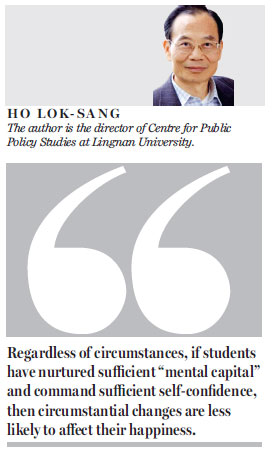HK students need to have more confidence in themselves
Updated: 2015-04-21 07:50
By Ho Lok-sang(HK Edition)
|
|||||||||
Ho Lok-sang says self-confident students should be able to handle encounters with people from different cultures and have little to fear from visits to mainland universities
Lingnan University's Centre for Public Policy Studies has released its 2014 Children's Happiness Index Survey. This year's study, commissioned by the Hong Kong Early Childhood Development Research Foundation (HKECDRF), was the third of its kind. The survey questioned 1,182 students from 10 secondary and 10 primary schools. Parents were also surveyed and 1,763 responded.
The index rose from 6.91 in 2012 to 7.23 in 2013, but recorded a significant decline to 6.74 in 2014. This warrants considerable reflection.
Children's falling happiness has occurred despite the decline in pressure from school work and extra-curricular activities. Family Life scores showed little change, children nevertheless perceived improvements in the financial wellbeing of the family and less disharmony, which is usually caused by the need for discipline at home.
Parents' happiness also showed slight improvements. So what was it in 2014 that had caused the decline in happiness?
The questionnaires were distributed and collected in October and November 2014. This was the period when "Occupy Central" was at its peak. There is reason to suspect the decline in children's happiness was related to "Occupy". During the protests, roads were blocked necessitating longer travel times between home and school; relationships were increasingly strained as people debated and argued and even "unfriended" those with different views. As Patrick Ip Pak-keung, chairman of HKECDRF, says, images of conflict and even violence in TV news reports and on newspaper headlines can increase people's anxiety and anger. Although it is difficult to arrive at a conclusive interpretation, it cannot be ruled out that these results are linked to the "Occupy" campaign.
Still, it was found that students who strongly agreed that their schools offered "life education" were much happier than those who agreed less or strongly disagreed. Their happiness index stood at 7.48, far higher than the average of 6.74 and a full 2.29 points higher than the 5.19 among students who strongly disagreed that their schools offered life education. This is really the most important finding of the 2014 survey. This shows that regardless of circumstances, if students have nurtured sufficient "mental capital" and command sufficient self-confidence, then circumstantial changes are less likely to affect their happiness. Life education is that required for personal development: Nurturing a respect for life and wisdom to deal with the stresses it can bring. Personal development is one of the modules covered in the secondary school liberal studies curricula. It is therefore notable that in no secondary schools did 50 percent or more respondent students agree to the statement "My school offers life education." Indeed, in only 3 out of 10 secondary schools did more than 20 percent of students strongly agree that their schools offered life education.
Students with a good level of life education will have more self-confidence, and be better at coping with stress and adversity.
They are not only more optimistic or positive, but better able to deal with the constraints they face. They have more independence of thought, and are not afraid of encountering those with different viewpoints, or from different backgrounds.
This brings to mind the overreaction of some students and the University of Hong Kong (HKU) alumni to the HKU's recent proposals to make mainland visits a compulsory feature of the HKU curriculum. A similar overreaction was displayed in 2011 as the SAR government moved to introduce Moral and National Education in Hong Kong's school curriculum. Students and their supporters were worried about brainwashing. Such an overreaction shows a lack of self-confidence. If students believe themselves capable of critical and independent thinking how can they be "brainwashed"? I myself undertook a student group trip to the mainland in the summer of 1974, and witnessed some sessions of the "The Criticize Lin (Biao), Criticize Confucius Campaign" movement in vogue at the time. I voiced a query about this to our accompanying Xinhua cadre, and discussed with him about the then prevalent official views that everything; music, art or literature, reflected the "class background" of their composers and authors, and that they should be banned lest the class struggle against capitalists be lost.
A good education must include acquiring an open mind, and that means a preparedness to be exposed to different things. That does not mean that anyone should lose one's critical thinking and judgment. Firmly rooted in a liberal education, critical thinking, and independence of thought, Hong Kong's youth should have the confidence to face up to the challenges of tomorrow, and see the real face of the mainland with their own eyes and personal experience.

(HK Edition 04/21/2015 page10)